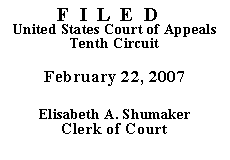

| UNITED STATES OF AMERICA, |
|
| v. | |
| RUBEN ZARAGOZA, |
I. BACKGROUND
In 1995 Mr. Zaragoza was sentenced to prison in Utah for issuing bad checks and sexual abuse of a child. After being paroled in 1999 he served three additional prison terms for parole violations. In May 2004 he absconded from a community corrections center where he was under parole supervision. Colorado law-enforcement officers received information in October 2004 that he was residing in Calhan, Colorado, and working at a bowling alley there. The owner of the bowling alley, Ms. Allie Brooks-Sawyer, had also hired him to work on her ranch doing yard work and helping her care for her horses. Ms. Brooks-Sawyer had borrowed a shotgun and given it to him to protect her horses from mountain lion attacks. He used it to kill rabbits and stored it under the bed in his bedroom at the ranch home. The officers who arrested Mr. Zaragoza found the gun during a search of the bedroom.
The presentence report computed an offense level of 17 and a criminal history in Category IV, resulting in a Guidelines sentencing range of 37-46 months' imprisonment. But the district court found that Category IV overrepresented the seriousness of his previous offenses and lowered his criminal history for sentencing purposes to Category III, reducing the Guidelines range to 30-37 months.
At sentencing, Mr. Zaragoza contended that the facts surrounding his crime justified a sentence below the Guidelines range. He claimed that he did not own the gun in question, that he used it exclusively on Ms. Brook-Sawyer's property to hunt rabbits and protect horses from mountain lions, and that his offense was unlike most others involving felons possessing weapons. The district court rejected these arguments, noting that (1) Mr. Zaragoza was being compensated for unlawfully possessing a gun in his work, and (2) he had absconded from parole and was a fugitive at the time of his arrest. The court imposed a sentence of 30 months' imprisonment.
II. DISCUSSION
Mr. Zaragoza challenges the reasonableness of his sentence. See United States v. Booker, 543 U.S. 220, 261 (2005) (reviewing sentences for unreasonableness). "[T]he reasonableness standard of review set forth in Booker necessarily encompasses both the reasonableness of the length of the sentence, as well as the method by which the sentence was calculated." United States v. Kristl, 437 F.3d 1050, 1055 (10th Cir. 2006) (emphasis omitted). "Reasonableness review is guided by the factors set forth in 18 U.S.C. § 3553(a), which include the nature of the offense and characteristics of the defendant, as well as the need for the sentence to reflect the seriousness of the crime, to provide adequate deterrence, to protect the public, and to provide the defendant with needed training or treatment." Id. at 1053 (internal citation omitted). We review the district court's "factual findings for clear error and legal determinations de novo." Id. at 1054.
We reject Mr. Zaragoza's argument that the sentence was unreasoned. The district court explicitly considered the factors in 18 U.S.C. § 3553(a). It heard and rejected Mr. Zaragoza's argument that he should receive a lower sentence. We see no error in the manner by which the district court sentenced Mr. Zaragoza.
We also reject Mr. Zaragoza's claim that the sentence was unreasonably long. The sentence was within the Guidelines range. Although there were some extenuating factors, the sentence was quite appropriate for someone who had violated his state parole on three occasions and was a fugitive from justice at the time of his arrest.
III. CONCLUSION
We AFFIRM the judgment of the district court. We GRANT Ms. Kathleen Torres's motion to withdraw as appellate counsel for the United States.
Entered for the Court
Harris L Hartz
Circuit Judge
*.This order and judgment is not binding precedent except under the doctrines of law of the case, res judicata, and collateral estoppel. It may be cited, however, for its persuasive value consistent with Fed. R. App. P. 32.1 and 10th Cir. R. 32.1.